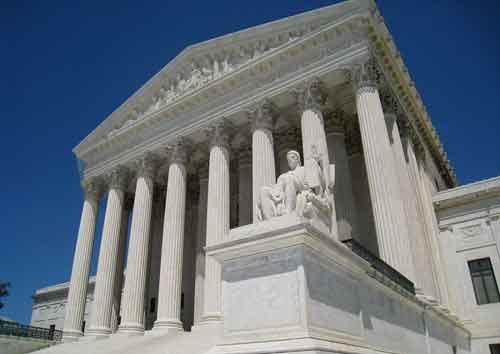
WASHINGTON—The U.S. Supreme Court upheld abortion rights Monday, ruling that states across the country had no right to curb the constitutional right of women to end their pregnancies by imposing an “undue burden” on them to limit their access to abortion clinics.
The 5-3 decision was perhaps the court’s most important abortion rights ruling in a quarter century.
The majority overturned a law in the southwestern state of Texas, similar to that enacted in other states, that required abortion doctors to have patient-admitting privileges at hospitals near their abortion clinics and that their clinics be equipped with costly hospital-grade healthcare equipment.
Writing for the court majority, Justice Stephen Breyer said that the state’s regulations were medically unnecessary and unconstitutionally limited a woman’s right to an abortion.
“The surgical-center requirement, like the admitting-privileges requirement, provides few, if any, health benefits for women, poses a substantial obstacle to women seeking abortions, and constitutes an ‘undue burden’ on their constitutional right to do so,” said Breyer.
President Barack Obama said he was pleased with the decision Monday, noting “every woman has a constitutional right to make her own reproductive choices.”
The Supreme Court ruling, coming on the last day of the court’s current term before its summer recess, could affect thousands of women in Texas alone, and many more throughout the U.S.
Nancy Northrup, president of the Center for Reproductive Rights, which represented the clinics, said, “The Supreme Court sent a loud and clear message that politicians cannot use deceptive means to shut down abortion clinics.”[xyz-ihs snippet=”adsense-body-ad”]
But Texas Attorney General Ken Paxton denounced the ruling, saying, “It’s exceedingly unfortunate that the court has taken the ability to protect women’s health out of the hands of Texas citizens and their duly elected representatives.”
Abortion rights advocates say the ruling could particularly benefit poor and minority women in Texas, giving them access to abortion clinics in their rural communities or small towns where they live, rather than seeing the clinics close because their operators said it was too costly to meet the requirements of the state law.
The abortion advocates said that the 2013 law had already forced the closure of about half of the state’s 40 abortion clinics and that more were set to close if the law’s constitutionality had been upheld, forcing women to travel hundreds of miles to the state’s remaining clinics in big cities.
The decision is likely to immediately reverberate through the country’s 2016 presidential race. The presumptive Democratic nominee, former U.S. Secretary of State Hillary Clinton, supports a woman’s right to end a pregnancy. Republican presidential contender Donald Trump says he is “pro-life,” opposed to abortion except in the cases of rape, incest or where the life of the mother is at stake. Years ago, he supported abortion rights.
Clinton called the decision “a victory for women in Texas and across America.”She said a “safe abortion should be a right, not just on paper, but in reality.” Trump had no immediate reaction.
The decision was made by the Supreme Court’s eight justices, with the court left with a vacancy when Justice Antonin Scalia died in February, shortly before lawyers for Texas and abortion rights groups made their arguments in the case. Scalia, a stalwart conservative on the court for nearly 30 years, was an ardent abortion foe.
In Monday’s ruling, the court’s four liberal justices sided with abortion rights groups to overturn a lower court’s ruling upholding the Texas law, and were joined by Justice Anthony Kennedy, a conservative justice who nonetheless over the years has mostly sided with abortion rights justices on the court. Kennedy had suggested at the March hearing on the dispute that lower courts might need to hear more evidence in the case.
The court’s three other conservatives — Chief Justice John Roberts and Justices Clarence Thomas and Samuel Alito — dissented from the ruling, voting to uphold the Texas law. If the court had deadlocked 4-4, the Texas law would have been upheld, although no national precedent would have been set.
Writing in dissent, Alito, said the court majority had overstepped its authority in the way it considered the case, when it could have limited the scope of its ruling.
“Federal courts have no authority to carpet-bomb state laws, knocking out provisions that are perfectly consistent with federal law, just because it would be too much bother to separate them from unconstitutional provisions,” Alito wrote.
Kennedy’s vote was also the decisive one in a 1992 case upholding abortion rights. Abortion was first ruled constitutional in a landmark 1973 decision that to this day is a contentious issue in American politics and society at large.
The 1992 ruling had a direct bearing on the Texas dispute since it set the standard that states could regulate abortion as long as they did not impose an “undue burden” on a woman’s right to the medical procedure. The court decided that the Texas law imposed such a burden.
With better birth control measures, the number of abortions in the U.S. has been falling in recent years, now down to below a million a year. But conservative states, where lawmakers are opposed to the medical procedure, have enacted more than 250 anti-abortion laws since 2010 aimed at cutting the number of pregnancies that are terminated.
Some of these laws could be affected by Monday’s Supreme Court ruling, while legal challenges to other state abortion restrictions could eventually reach the high court in the years ahead.
Source: VOA [xyz-ihs snippet=”Adversal-468×60″]






